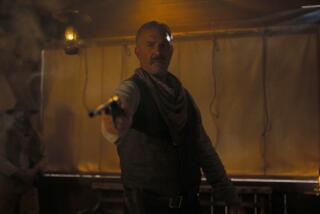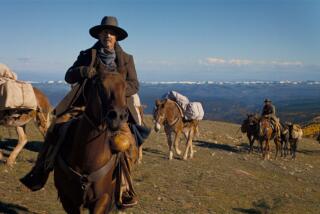Under the New Mexico sky, ‘The Lone Ranger’ rides again
- Share via
ALBUQUERQUE — Johnny Depp was the picture of breezy relaxation as he walked bare-chested across the “Lone Ranger” film set in the high desert of New Mexico last May — despite the punishing midday glare and the pelting sand from a brewing windstorm.
“At the very least, I’m one of the lucky ones, since I don’t have to wear a shirt,” said Depp, who plays a reimagined version of Tonto that defies the standard sidekick expectations in the film that arrives in theaters on July 3 as the most expensive Hollywood western ever made. “Tonto is the smart one when it comes to keeping cool,” Depp added.
By any measure, Tonto is far more wily than John Reid, the by-the-book lawman who has a masked destiny as the film’s title character awaiting him on the dusty frontier. Reid is played by Armie Hammer, the 6-foot-5 actor best known for his roles as the embroiled Winklevoss twins in “The Social Network” and the FBI chief’s dapper right-hand man in Clint Eastwood’s “J. Edgar.”
The garrulous Hammer says he marvels at Depp’s talent and, fresh from a scuffle scene with his costar, laughed out loud when asked whether there were any parallels between the pair’s relationship on-screen and off.
“It’s very similar to our characters, because we are stuck together by fate,” Hammer said, squinting through sweat and the pale dust that coated the entire set. “We are less like our characters in that we’re just having a great time together.”
The two look like they’re having fun while filming a tussle that leaves Hammer’s character dazed and flat on his back in the scrub while Depp’s Tonto marches off into the desert beneath the stuffed crow that he wears atop his head like a winged, ebony crown. As Depp shook his head with amused admiration, his young costar moaned from the desert floor. “I think,” Hammer said, “I did something to my cortex.”
In many ways, this new project flies under the same flag as Depp’s “Pirates of the Caribbean” franchise. It reunites the actor with director Gore Verbinski and producer Jerry Bruckheimer, the trio that launched the swashbuckling series amid a deafening chorus of skepticism from outsiders (who said the genre had no place in a post-”Matrix” marketplace) and the studio (where executives fretted about Depp’s fey and boozy Jack Sparrow anti-hero). The trio was right, and everyone else was wrong.
For the producer, the mythology of the Lone Ranger — the silver bullets, the Rossini theme song, the white steed, the call of “Hi-yo, Silver!” — was a hometown heritage. Bruckheimer hails from Detroit, and so does the masked man. The Old West, it turns out, was located over on East Jefferson Avenue, where WXYZ-AM launched “The Lone Ranger” radio show in 1933 and watched it grow into a national sensation.
“I was like every kid with the six-shooters and playing cowboys and Indians, and now here we are, the biggest game of cowboys and Indians you could have,” Bruckheimer said as he walked toward one of the film’s major expenses — an eight-mile stretch of new railroad, two locomotives and a row of meticulously manufactured train cars.
And, yes, there’s a major train wreck in the film. That fact will tantalize Hollywood pundits who pounced on the project in 2011 when Rich Ross, then the chief of Walt Disney Pictures, pulled the plug on it in a public way and then reinstated it weeks later after the $250-million budget had been shaved to $215 million.
Will the wisdom of the trio prove right again? Bruckheimer thinks the film is a sure bet.
“This is a great summer movie, with classic characters and a new story with a lot of gravitas,” he said. “And we have one of the biggest movie stars in the world with Johnny and a star-in-the-making with Armie. And this is a very different version of this story.”
Indeed, the script by Justin Haythe (“Revolutionary Road”) mines the rich terrain that lies between frontier truth and Old West legend. It presents Tonto as “a tribe of one,” as Haythe puts it, and a character who is not always what he seems — he’s misleading and a touch mystic, a con man connected to the cosmic. If that doesn’t sound like the Tonto you remember (most likely Jay Silverheels, the taciturn sidekick in buckskin who shared the trail with Clayton Moore’s Ranger) well, that’s the whole point.
“We were focused more on the true Native American aspect instead of interpreting this artificial version that was a mash-up of make believe and [stereotypes],” Depp said, “and that became the way they’ve been represented in film for 100 years or more.”
Despite the unlined face, Depp turns 50 a few weeks before “The Lone Ranger” hits theaters. That milestone and the tepid commercial success of his last film, “Dark Shadows,” will stir questions about the star’s wattage level, but under the New Mexico sky he seemed a million miles away from that sort of career calculation. The man with the painted face wasn’t interested in predictions or destinations.
Depp was too possessed by the moment and the promise of the journey. “The desert doesn’t even notice us, we aren’t here long enough,” he said, sounding sage and centered despite the black bird sprouting from his head. “It’s the ride, that’s the fun part.”
More to Read
Only good movies
Get the Indie Focus newsletter, Mark Olsen's weekly guide to the world of cinema.
You may occasionally receive promotional content from the Los Angeles Times.










